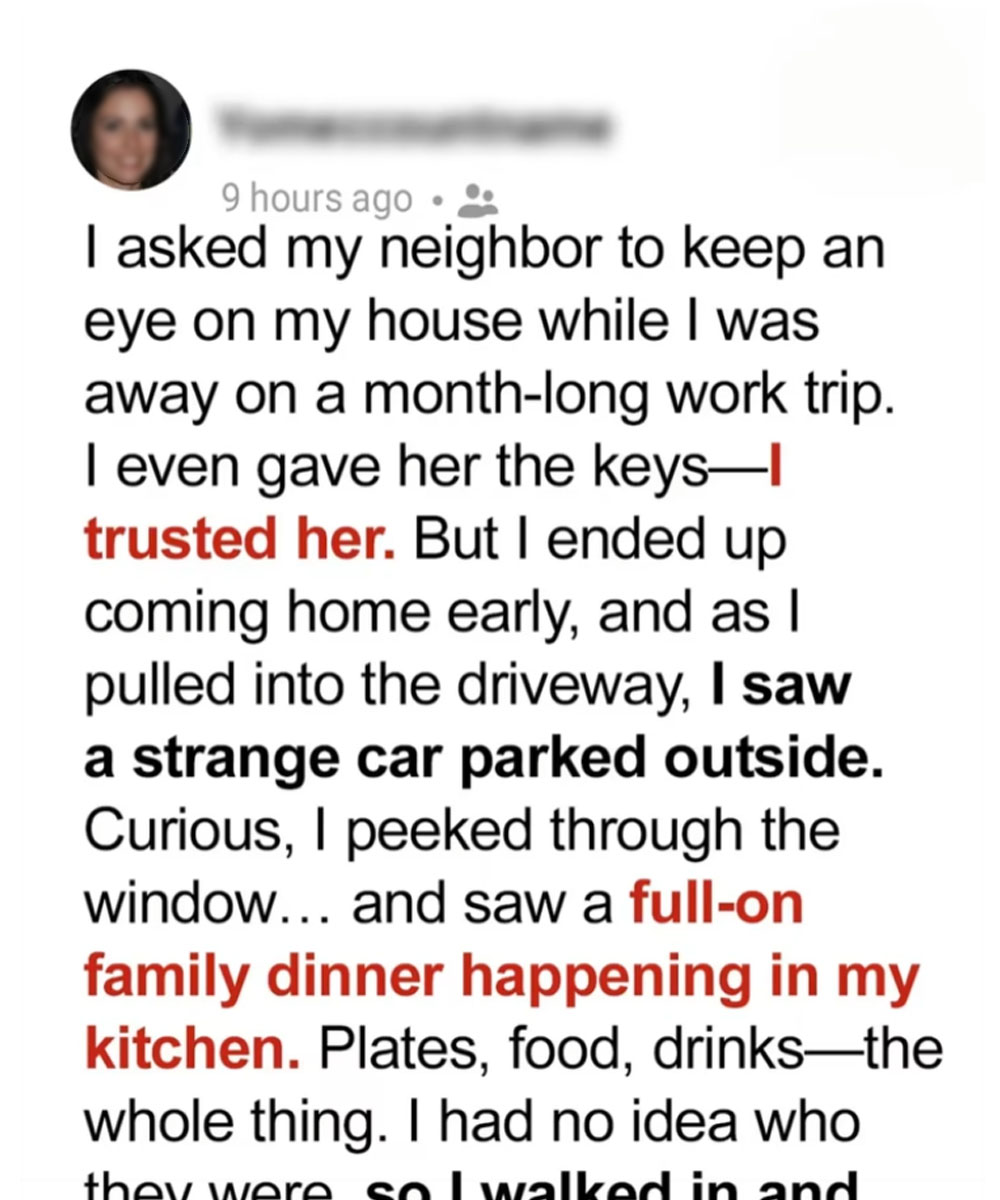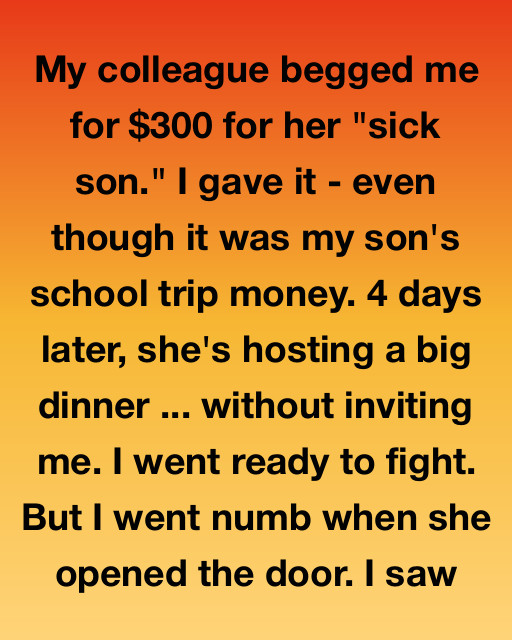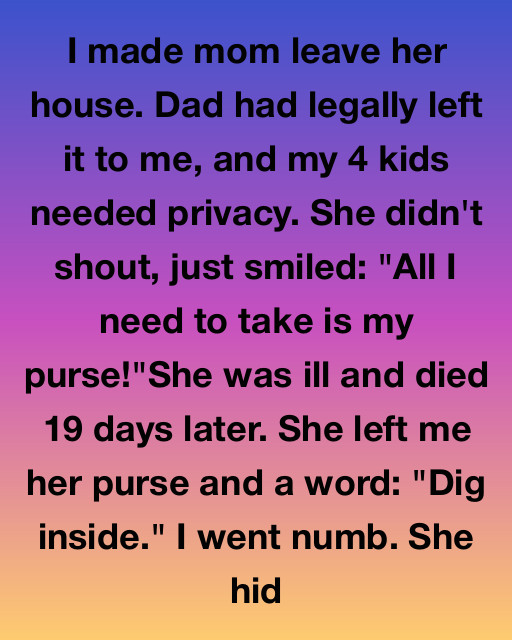I even gave her the keys—I trusted her. But I ended up coming home early, and as I pulled into the driveway, I saw a strange car parked outside. Curious, I peeked through the window… and saw a full-on family dinner happening in my kitchen. Plates, food, drinks—the whole thing. I had no idea who they were so I walked in and everything fell silent. An older woman with iron-gray hair dropped her fork, and a teenager froze mid-bite. There was my neighbor, Riona, at the head of the table, acting like the lady of the house.
For a moment, nobody spoke. Then Riona stood up, cheeks flushed. “Oh! You’re… back early,” she stammered. My eyes flicked from one face to another. Who were these people? A man in his forties with a heavyset frame cleared his throat. “Look, I know this seems bad…” he began, but I cut him off. “Who are you?” I demanded, my voice shaking. Riona tried to smooth things over, saying they were just having a little get-together. But it was clear this wasn’t a casual meal. There were kids’ toys scattered in the living room and a suitcase tucked near the stairs. My stomach dropped.
I stepped back, scanning the house. My home looked lived-in, but not by me. Blankets on the couch, a grocery list on the fridge, shoes by the door—none of them mine. It was like someone had moved in while I was gone. Riona followed me into the hall, whispering frantically that she needed a place after her brother lost his job and they were evicted. She’d meant to ask me, she said, but time slipped away. I couldn’t believe it. I had trusted her with my keys, and she’d turned my house into her personal Airbnb.
The man—her brother, apparently—walked up behind her and tried to reason with me. He insisted they kept everything clean and took good care of the place. That just made it worse. They thought their good behavior excused squatting in my home? My mind was spinning with anger and disbelief. I asked how long they’d been there, and Riona hesitated before admitting they moved in the day after I left. Almost a month. A month of strangers living in my bed, cooking in my kitchen, showering in my bathroom.
I told them to leave, but Riona’s brother refused. He argued they had nowhere else to go. The kids’ eyes filled with tears, and I felt a stab of pity. But it was quickly replaced by rage. This was my house. My safe space. And they’d violated it without a second thought. I called the police, heart pounding in my chest. As I waited, Riona begged me not to do this in front of the children. I almost wavered, seeing the kids’ scared faces, but I reminded myself it wasn’t my fault they were here.
The police arrived quickly, and the family was escorted out. An officer told me I could press charges, but something inside me hesitated. I asked for a moment alone. Standing in my living room, I realized how torn I felt. They’d taken advantage of me, yes—but they were also desperate people. Did I really want to add more trauma to those kids’ lives by putting their mom and uncle behind bars? I decided not to press charges, but I made it clear they could never come back.
After they left, the house felt cold and empty. I noticed dirty dishes in the sink, fingerprints on the fridge, and unfamiliar shampoo bottles in my shower. The violation felt deeper than I expected. I didn’t sleep that night. I kept imagining strangers creeping around my home, touching my things, laughing at my expense. In the days that followed, friends told me I was crazy for not pressing charges. Maybe they were right. But I couldn’t stop thinking about the kids’ faces.
A week later, I saw Riona in the grocery store parking lot. She looked tired, thinner, and more stressed than before. When our eyes met, she looked away. But then she turned back and approached me. She apologized again, this time more sincerely, and admitted what she did was wrong. She explained they were sleeping in their car now, trying to get into a shelter. Part of me wanted to snap at her, but another part couldn’t ignore the human side of this.
I decided to ask if she needed help finding resources. It felt like the right thing to do, even after everything. She was shocked but accepted, and I helped her contact a family assistance program I knew through work. Over the next few weeks, I learned more about what led her to my doorstep: unpaid bills, an absent ex, job layoffs, and bureaucratic nightmares. It didn’t excuse what she did, but it made me understand.
Meanwhile, I worked on reclaiming my home. I changed the locks and deep-cleaned every room. I even hired a friend’s cousin, Jarek, to repaint the walls because I couldn’t stand the thought of strangers’ memories lingering. As he painted, we talked about trust, second chances, and the fine line between kindness and being taken advantage of. Jarek shared how he’d once let a friend stay at his apartment, only to return to find everything pawned off. His story made me realize I wasn’t alone.
One evening, while organizing my kitchen, I found a crayon drawing tucked in a cookbook. It was clearly from one of the kids—two stick figures holding hands, one labeled “Me,” the other labeled “Nice Lady.” My throat tightened. They’d drawn me. That night, I couldn’t stop crying. I hated what they’d done, but I also couldn’t deny the strange connection I felt to those children.
A month after the incident, I ran into Riona again. This time, she looked more stable. She had managed to get a job at a local diner and was staying in transitional housing. She thanked me for not ruining their lives and said the break they got gave her a chance to start over. I told her I hoped she kept going, for the kids’ sake. We parted with an awkward but genuine handshake.
Word spread in the neighborhood about what happened. Some people were sympathetic, others judgmental. I heard whispers about how I was too soft. But a few neighbors approached me quietly, sharing how they’d been in tough spots themselves once. It made me realize how many people live on the edge, one emergency away from losing everything.
Months passed, and life slowly settled back into normal. I still double-checked the locks every night, a new habit I couldn’t shake. But I also found myself volunteering at a local food pantry on weekends. It felt like a way to balance my anger with compassion. I couldn’t save everyone, but I could make a difference for a few.
One Saturday at the pantry, I saw Riona helping distribute bags of groceries. We exchanged a nod. She had brought her kids, and they were smiling, laughing even. They looked like they had hope again. In that moment, I felt something shift inside me. I realized that sometimes, even when you’re wronged, you have the power to turn it into something good.
I went home that night and sat on my porch, watching the sun set over the quiet street. I thought about trust, forgiveness, and how complicated life could be. I remembered the anger I felt walking into my home that day, but also the conversations that followed, the understanding that grew, and the chance to help someone rebuild.
I don’t regret not pressing charges. I learned that compassion doesn’t mean letting people walk all over you—it means seeing their humanity and finding a way forward without losing yourself. I also learned to set better boundaries. If I ever need someone to watch my house again, I’ll leave a key with a trusted relative instead of a neighbor I barely know.
In the end, what started as a betrayal became an opportunity to grow—for both me and Riona’s family. I don’t know where they’ll end up, but I hope they find stability. And I hope the kids remember that someone believed they deserved a second chance. Because we all do, sometimes.
The biggest lesson I took from this is that life isn’t black and white. People make bad choices when they’re desperate, but they can also rise when given support. I know now that trust is precious and should be given carefully, but also that kindness can change the course of someone’s life—even your own.
If you’ve ever been in a situation where someone broke your trust, I hope my story helps you see there’s always more beneath the surface. Don’t be afraid to stand up for yourself, but don’t let bitterness harden your heart either.
If this story touched you or made you think, please like and share it so others can reflect too. 👇




